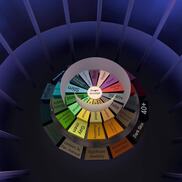 My privilege: I am white-passing, female-passing, have a post-secondary education, have english as my first language, have citizenship by birth and live in the United States, am stable enough in my economics to afford more than basic necessities (such as a VR headset and several website domains). My marginalized identities: I am biracial, not male passing, non-binary gender, large body sized, and have existed the majority of my life with moderate to severe life-long disability. My privilege, when not earned and released as a routine process, can make me blind to how I wield my power and inadvertently lead to harm. While intention matters in all of our actions, ultimately, the outcome matters the most. And the outcome in the following story is yet to be determined.  As a social scientist and community developer I am aware that callout culture can be experienced as an assertive OR vengeful intervention done by an individual or group targeting an individual or group (in the same group or overlapping groups) where a behavior or set of behaviors is named as harmful and is judged to not fit with the values and ultimate sustainable direction of a group. From someone who has recently chose to call out an entire demographic of intersecting majority power stakeholders (white males) in a social VR application I frequent, I can confirm that the burn of being targeted back as an individual by a group of people holding majority power is extremely unpleasant. Alas, this is the cost of allyship, but ultimately, the question that follows is "what is the outcome?" Did it work? did anything change? That remains to be seen. But, in the meantime, reflecting on my actions and my priviledge in the polarization that naturally ensues when dominant power is called out, I have to re-examine if I did the wrong thing, even if for the right reasons. Did I cause more harm with my admonition than help? This doesn't mean using one's power to call out something such as abuse or misuse of power and taking up space is wrong or bad. For example, I used to work as a vet technician and had the occasional duty of assisting with the expression of infected wounds (or abscesses) on animals. At times, due to expenses or other complicating medical conditions, the animals had to be partially or fully awake during the procedure. Similar to the procedure of drawling blood, the animal was wrapped up in a towel and held firmly while pressure was applied and a small incision was made on the scab area of where the abscess was. The shriek and scream of the creature was often ear-splitting. I did not go in the veterinary field to cause pain to animals, so in the first few procedures I assisted on, these sounds played on my guilt and worry emotions and spun me into an existential angst that sometimes lasted for days. However, what was striking to me over and over is the relief these animals displayed once the wound was emptied and cleaned out. Many times, cats would go from sounding like they were planning to murder all of humanity the moment they had their claws and teeth free again to purring like a kitten after a satisfying meal --within a few minutes of being released.
The proverbial cat in this metaphor represents the group creatures in VR who are frequently dominated by white-male privilege and misuse of power. Patriarchy is not inherently wrong or bad, however, because the pattern of patriarchy held by white males has been a pervasive and controlling power structure at every facet and level of our real lives and our ancestors lives throughout the written history of dominant culture, it can feel extremely divisive to anyone (especially white males) who has not done the work of awakening to their privilege when white male power is called out. Callout culture can lead to a ricocheting blame game of shaming other people for something we do not want to embrace or look at within ourselves. It hurts to be called out, and I keep reminding myself, even if it's uncomfortable, it is still important sometimes to do this when a group norm (or accepted behavior engaged in by many people) is leading towards toxicity and non-diverse duality. Sometimes we cause pain to grow more balanced together. It never feels good to do this, but sometimes maybe it is necessary. I rarely engage in a call-out intervention at a group or public level because of the whiplash it often leads to which includes a rippled effect in the general group that the bubble of safety/belonging has been shaken or eviscerated all together. Groups will re-form and stabilize eventually, but the initial discomfort and pain expressed can shake everyone to their core. Uncomfortable is labeled as toxic and the bringer of discomfort is pegged as a conflict-bringer and pot-stirrer (to put is nicely). Callout culture can be a reaction to cancel culture. Cancel culture can look initially like ignoring someone and can also become as large as blocking them and/or creating rumors about them that lead to group shaming and blocking. I have learned a specific tolerance of being canceled through my ongoing non-negotiable marginalized identities and experiences. However, when I hold power and privilege in a social situation (which as seen above, I increasingly have significant majority as an individual), and see intersectional marginalized people or groups being canceled by intersectional power/privilege identities, I rapidly lose my individual tolerance and discover a boldness in my core that leads me to speaking my truth to power in a way that can sometimes blow up in my face. If you are a part of Facebook Horizon Community Group on Facebook, you can watch the blow-by-blow of me practicing a call out intervention here. Well, the truth continues to come (some might say spew, but that's depending on the audience I guess) in my next blog where I express concern and confusion on a recent post by Facebook Oculus that appears to be including me in black-facing their women's history celebration. Call it Covid, or 2020, or being single and alone for way to long, but I am taking no hostages here. I can't stay silent when power is being mis-used, even in a twisted way to benefit me possibly, anymore.
0 Comments
Leave a Reply. |
AuthorThese are reflections on VR community design experiments, collaborations, and my individual user experience. How do we connect through the virtual reality medium in a way that enhances our connection with self and our real life relationships? Archives
August 2021
Categories |
 RSS Feed
RSS Feed